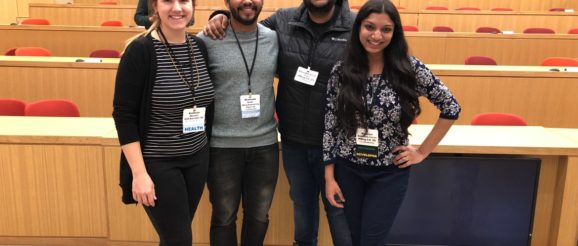Innovation and Creativity Abound at Cornell’s Second Digital Agriculture Hackathon

Over 150 students from Cornell, the U.S. and the world came together at the Cornell Vet School for 36 hours from Friday to Sunday afternoon to modernize one of the world’s oldest industries — agriculture.
“Agriculture is arguably the least digitized industry of all major industries,” said event chair Prof. Steven Wolf, natural resources. “So there’s tremendous opportunities to bring the power of data, sensors, data analytics, and machine learning and artificial intelligence to bear.”
This year marked Cornell’s second Digital Agriculture Hackathon, which was established to “hack” innovative solutions to modern shortages in the agriculture industry.
“We’ve created an event that is very inclusive, and we’ve created challenges for the students that represent the whole breath of agriculture and food systems,” Wolf said.
The purpose of the hackathon was to engage both undergraduate and graduate students from a variety of disciplines on the subject of digital agriculture, Wolf said. Digital agriculture involves an intersection between agriculture and technology.
By invoking technologies like AI, and innovations in computer science the organizers hope to address the shortages in agriculture predicted to manifest in the next decade.
“Digital agriculture is a very broad term… it provides a reference to an opportunity to bring digital sensibilities and a data rich approach to a whole raft of problems in agriculture and food,” Wolf said.
Students organized themselves into 25 teams and pitched solutions related to one of five suggested challenge categories: production and the environment, controlled environment agriculture, sustainable agriculture, small farms and food systems.
Judges assessed teams by their performance in four categories: novelty, social impact, market-readiness and data analytics.
The $2,000 grand prize went to Team AgPal, a group that focused its project on helping small, rural farmers increase their revenue. The team developed a digital interface that utilizes a scoring engine, which uses data on crop production and market prices to predict how farmers can optimize their profits.
One of the motivations behind Team AgPal’s project was its concern for high rates of farmer suicides.
In recent years the stress associated with farming has culminated in a rising issue of suicide among farmers. In fact, the suicide rates among farmers in the U.S. is more than double that of veterans.
“The primary reason for farmer suicide is excess supply,” said team member Soumya Ananthakrishna M.Eng. ’20. “[Farmers] are producing a lot of food and simply cannot find the right market at the right time. They’re just not able to find markets of demand. And we here are trying to solve that.”
Four other teams took home $1500 each for their performance in one of the four categories used for judging.
Team Bagasse won for most novel solution with their prototype prebiotic beverage made from a waste product of tequila called bagasse, which is a fibrous byproduct of extracting sugar from sugar cane that is often used as a biofuel.
The award for best data analysis went to Team MicroSoil, a group that created a prototype of an in-field rapid soil testing kit that farmers can use to test for pathogens and micronutrient deficiencies.
Team ConsumABLE won an award for most market-ready pitch. Team ConsumABLE developed an app that people with food related health conditions can use to decrease their risk of being exposed to a food ingredient that could cause an adverse reaction.
Eight sponsors, including Microsoft and Cargill, supported the event and over 60 mentors from the sponsoring companies and attending universities offered guidance to the participating teams.
According to Wolf agriculture is the single largest source of land use, meaning that it has huge implications for the environment, culture, aesthetics and regional identity – making hackathons like this important for the future of agriculture.
“As biological organisms, we need to eat or we perish,” Wolf said.
